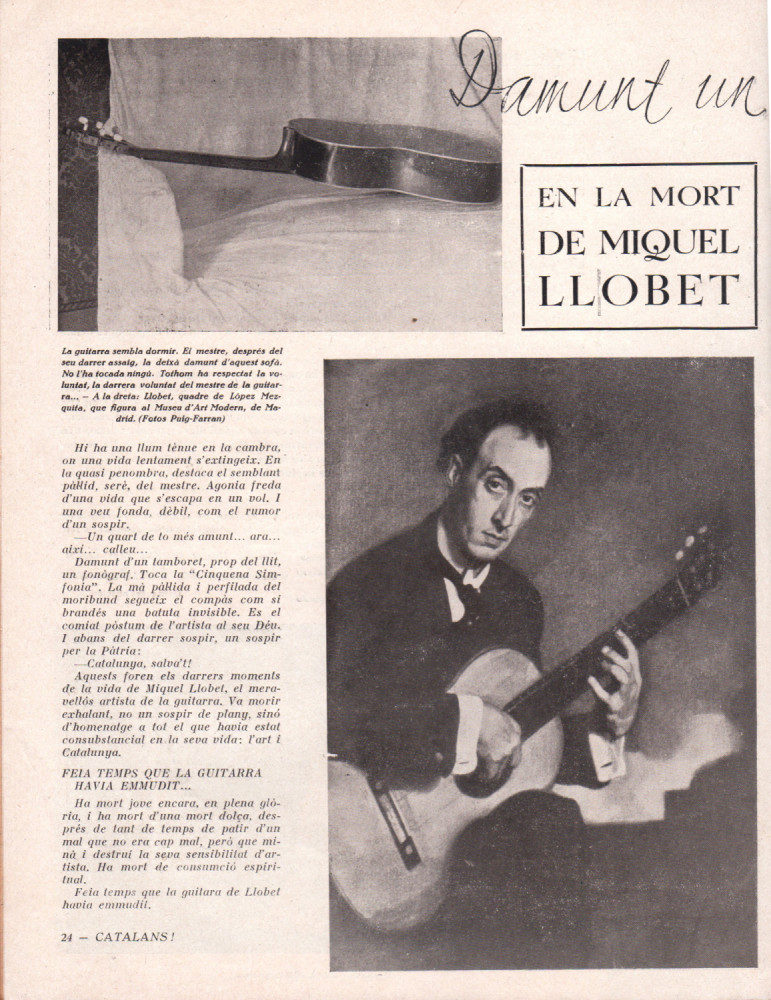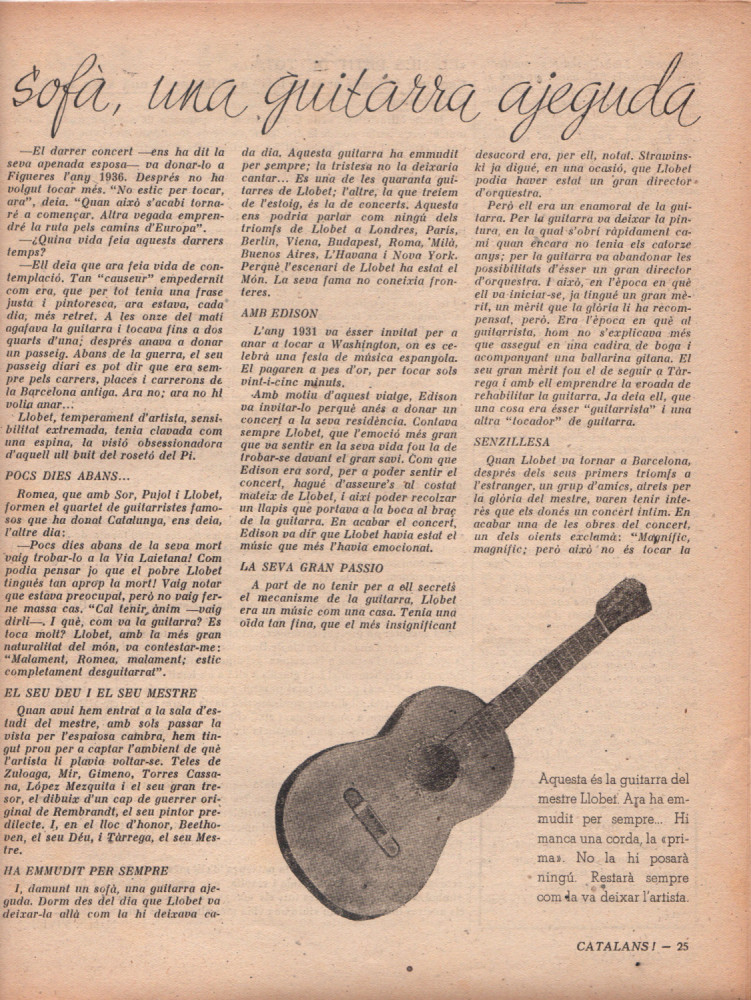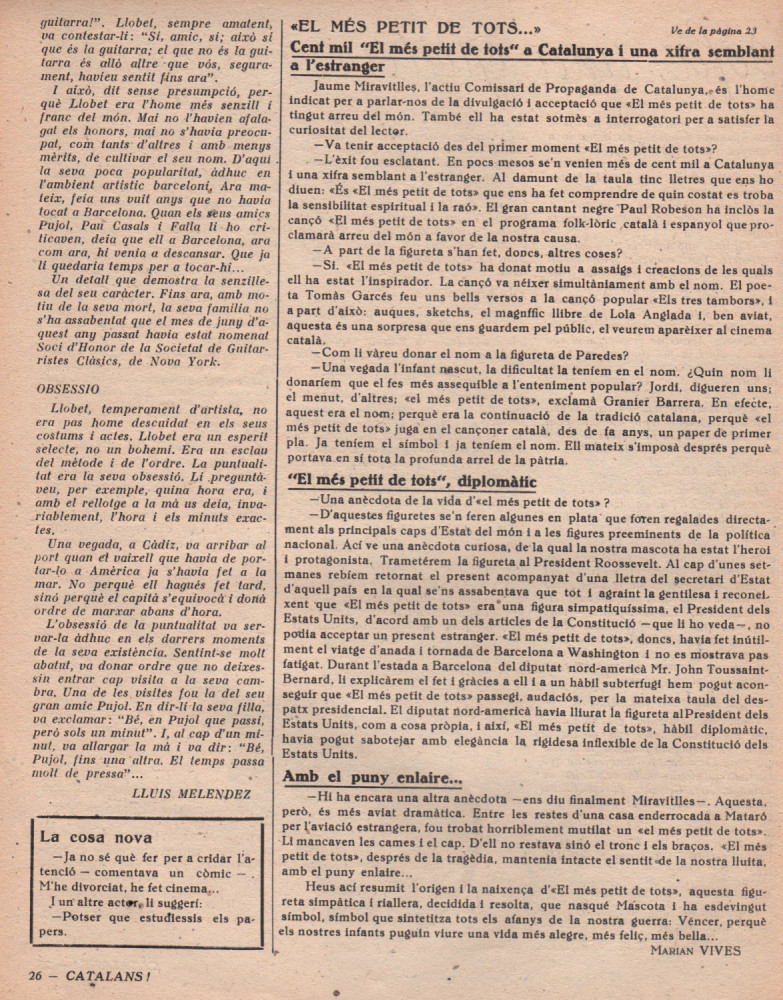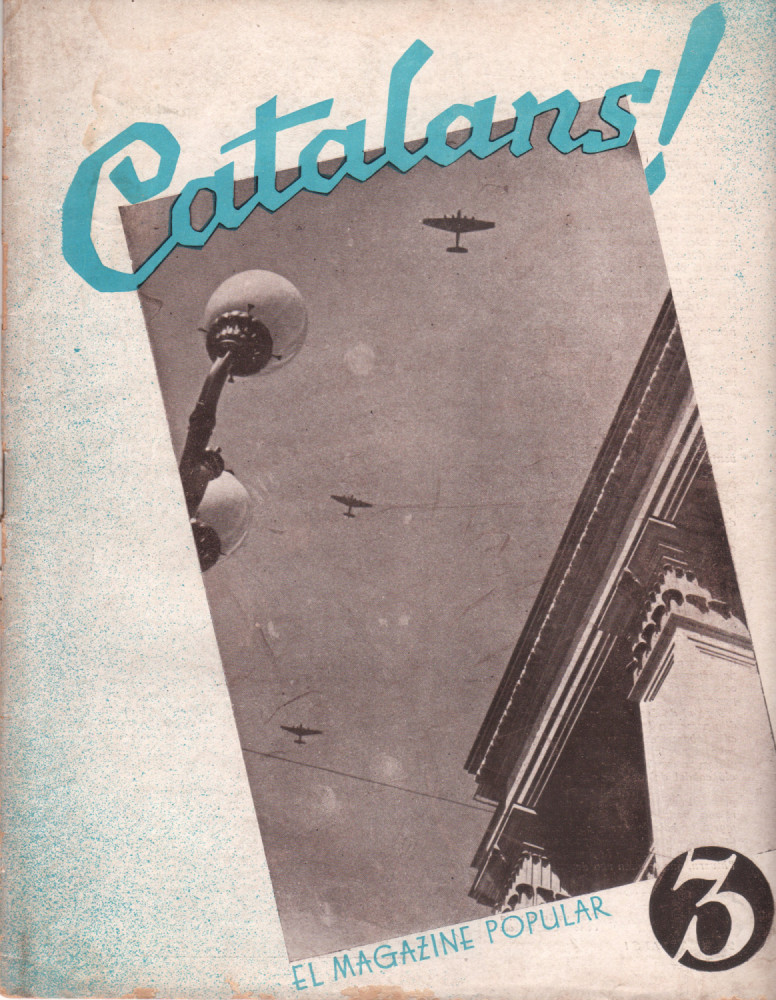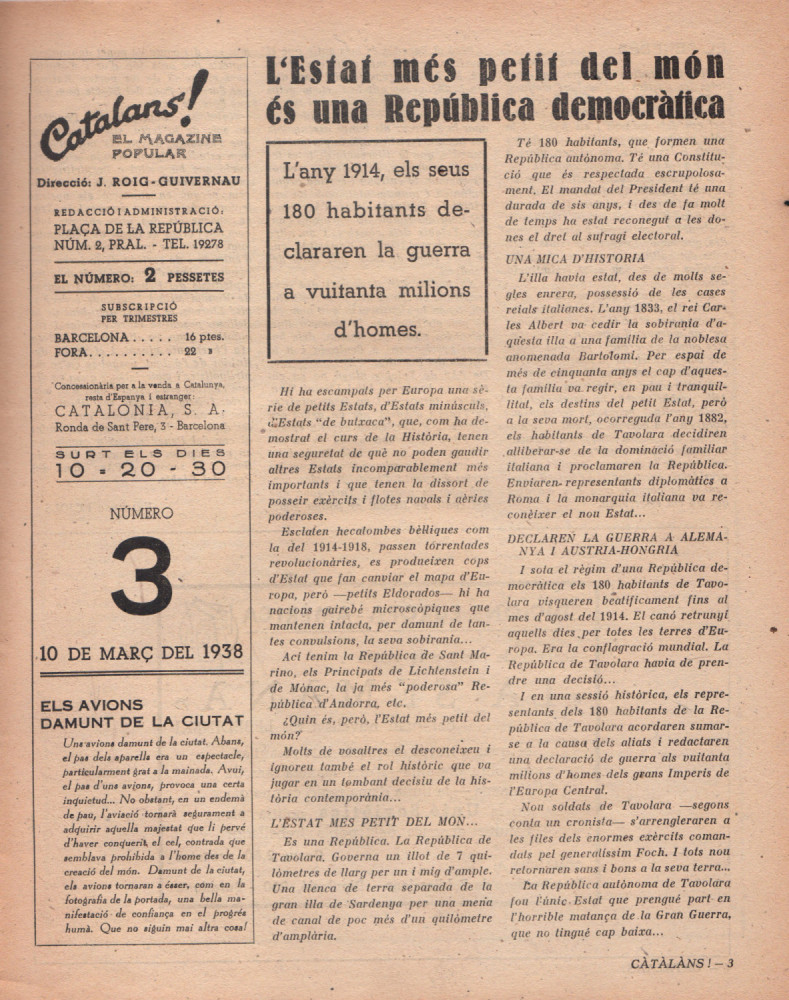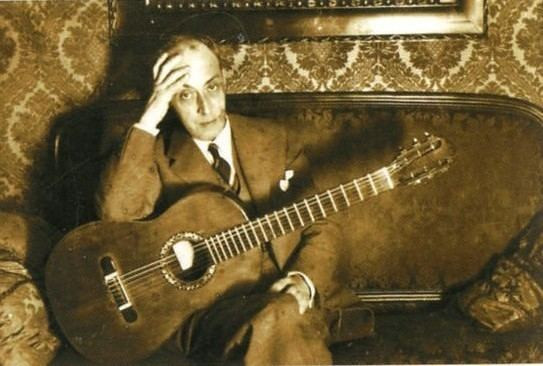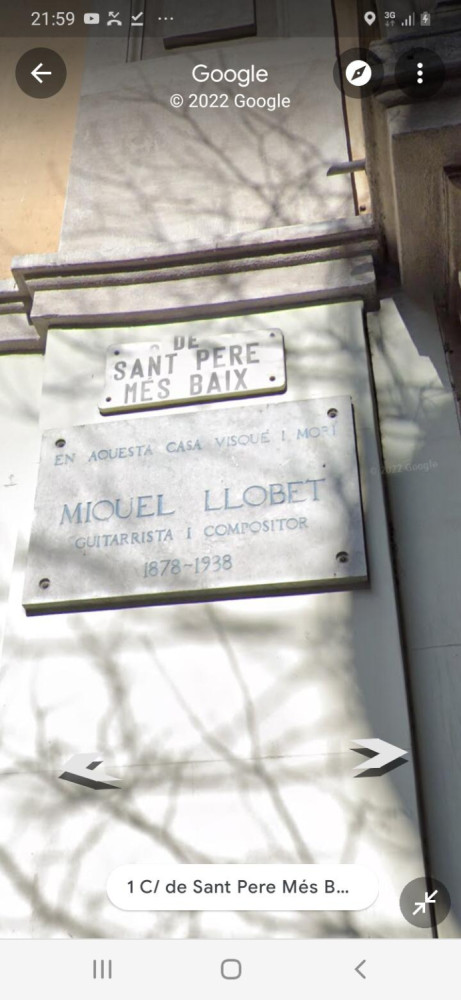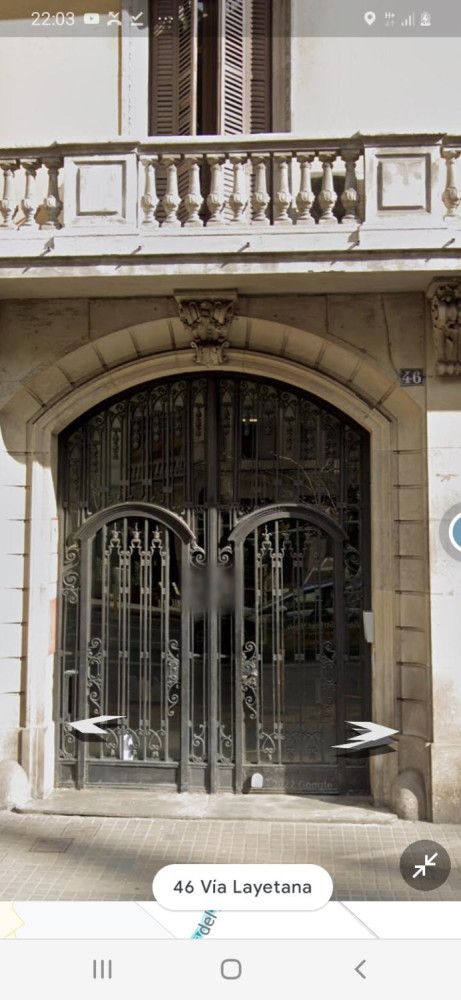Obituary of Miguel Llobet (October 18, 1878-February 22, 1938)
"Catalans" issue No. 3 magazine article March 10, 1938
This article, in Catalan language, was published just 16 days after the passing of Miguel Llobet. There is a lot of insight into the last years and days of his life.
At the end of this listing is a photo of a plaque commemorating the life and works of Miguel Llobet and a photo of the entrance to his home at Via Laietana 46, Barcelona.
"About the death of Miquel Llobet." Above a sofa a guitar is overturned downward ( Subtitle: Damunt un sofa, una guitarra ajeguda)
The guitar appears to sleep. The Maestro, after his last study, left it on top of this sofa. No one returned to play it. All have respected the will, the last wish of the maestro of the guitar....
To the right is the painting by Lopez Mezquita, that's in the Museum of Modern Art in Madrid.
There is still a light on in the room, where the life was slowly extinguished. In the almost gloom, the pale, serene resemblance of the master stands out. Cold agony of a life that escapes on a flight. And a wavy voice, weak, like the sound of a sigh.
A quarter tone higher... now... like this... that is closed off...
On the stool, near the bed, a phonograph. It plays the ''Fifth Symphony'' the pale and outlined hand of the dying man follows the beat as if moving an invisible baton. It is the posthumous farewell of the artists to his God. And before the last breath, a sigh for the country.
Catalonia save yourself!
These were the last moments in the life of Miguel Llobet, the wonderful artist of the guitar. He died exhaling, not a sigh of mourning, but of homage to everything that had been consubstantial in his life: art and Catalonia.
The guitar had been silent for a long time ....
He has died young still, in full glory, and he has died of a sweet death, after so long a time of suffering from a malady it was no harm, but which undermines and destroys his sensibility as an artist. He has died of spiritual consumption.
Llobet's guitar had been silent for some time ....
"The last concert" - his sad wife told us - "he gave it in Figueres, Catalunya in 1936. Then he didn't want to play anymore." “I’m not about to play, now,” he would say. "When this is over I will start again. Once again take the route along the roads of Europe"
- What was your life like lately?
-He said he was now living a life of contemplation. As hardened as the "cause" as he was, who had a just and picturesque phrase for everything, he was now, every now and then, a self-portrait. At eleven o'clock in the morning he would pick up the guitar and play until two-thirty; then he was going for a walk. Before the war, the daily walk can be said to have always been through the streets, squares and alleys of old Barcelona. Now no; now I didn't want to go ....
Llobet, artist's temperament, extreme sensitivity, had a common thorn in his side, the obsessive sight of that empty eye of the pine rosette.
A few days before
Alfredo Romea, who with Fernando Sor, Emilio Pujol and Miguel Llobet, form the quartet of famous guitarists that Catalonia has given us, told us the other day:
A few days before his death I found him on the Via Laietana! How could I think that poor Llobet was so close to death! I noticed I was worried, but I didn’t pay too much attention to it. "We must have it - I said - And what, how is the guitar? Do you play a lot? Llobet with the greatest naturalness in the world, answered me: "Bad, Romea, bad; I'm completely out of shape. "
His ten and his master
Today, when we entered the master's study room, just passing the visit through the spacious room, we were prone to capture the atmosphere that the artist liked to go around. Canvases by Zuloaga, Mir, Gimeno, Torres Cassana, Lopez Mezquita and its great treasure, the drawing of an original warrior chief by Rembrandt, his favorite painter, and in his place of honor, Beethoven, his God, and Tarrega, his Master.
He has been silenced forever
And, on a sofa, a guitar that Llobet left upside down. She has been sleeping since the day Llobet left her there as she left her every day. This guitar I have silenced forever; sadness is not allowed to be sung ....
It is one of Llobet's forty guitars.
The other, the one we take out of the case, is that of concerts. She could tell us like no other about Llobet's triumphs in London, Paris, Berlin, Vienna, Budapest, Rome, Milan, Buenos Aires, Havana and New York. Because Llobet's stage has been the World. His fame knew no borders.
With Edison
In 1931, he was invited to play in Washington, where a Spanish music festival is held. They paid him in gold, to play for only twenty-five minutes.
On the occasion of this trip, Edison invited him to go and give a concert at his residence. Llobet always told me that the greatest emotion he felt in his life was to be in front of the great sage. Since Edison was deaf, in order to hear the concert, he had to sit right next to Llobet, and thus be able to support a pencil that he carried in his mouth, on the arm of the guitar. At the end of the concert, Edison said that Llobet had played the music that had made him the most emotional.
His great Passion
Apart from not having secrets kept from him by the mechanism of the guitar, Llobet was a musician like a house. He had such a fine ear, that the most insignificant disagreement was, for him, noticed. Stravinski once said that Llobet could have been a great conductor.
But he was in love with the guitar. For the guitar he left painting, in which he quickly made his way when he was not yet fourteen years old; for the guitar he abandoned the possibilities of being a great conductor. And that, by the time he began, already has great merit, a merit that glory has rewarded him, however. It was the time when the guitarist could only be told sitting in a chair, in vogue and accompanying a gypsy dancer. His great merit was to continue in Tarrega and with him to undertake the task of rehabilitating the guitar. He used to say that it was one thing to be a "guitarist" and another to be a "guitar player".
Simplicity
When Llobet returned to Barcelona, after his first triumphs abroad, a group of friends, attracted by the glory of the master, were interested in giving the women an intimate concert. At the end of one of the works of the concert, one of the listeners exclaims: "Magnificent, magnificent; but that is not to play the Guitar." Llobet, always attentive, replied: "Yes, friend, yes; that is the guitar; what is not the guitar is something other than you, surely, you have heard so far."
And this, said without presumption, because Llobet was the simplest and most frank man in the world. He had never been flattered by honors, he had never cared, like so many others and with less merit, to cultivate his name. Hence its low popularity, even in the artistic environment of Barcelona. Right now, he hadn't played in Barcelona for about eight years. When his friends Pujol, Pau Casals and Falla criticized him, he wished that he would come to Barcelona to rest for now. That he would have time to play ....
A detail that demonstrates the simplicity of his character. So far, on the occasion of his death, his family has not learned that in June last year he had been named an Honorary Fellow of the Society of Classical Guitarists, of New York.
Obsession
Llobet, an artist's temperament, was not a careless man in his customs and actions. Llobet was a select spirit, not a bohemian. He was a slave to method and order. Punctuality was his obsession. He asked him aloud, for example, what time it was, and with the clock in his hand he invariably told you the exact time and minutes.
Once, in Cadiz, he arrived at the port when the ship that was to take him to America had already been put out to sea. Not because you were late, but because the captain was wrong and ordered it to leave early.
The obsession with punctuality comes to serve it even in the last moments of its existence. Feeling very depressed, he ordered her not to let any visitor into his room. One of the visitors was that of his great friend Pujol. When his daughter told him, he exclaimed, "Well, let Pujol come in, but only for a minute." And after a minute, he reached out and said, "Well, Pujol, until another visit. Time goes by very fast."
Lluis Melendez
Caption - (This guitar was made by Jaime Ribot y Bautista Alcaniz in Barcelona, it is No. 12 of 18 guitars donated on January 19, 1953 by his daughter, Miguelina, to the Museu de Musica in Barcelona. I have included a well known photo showing this guitar from the article in his hands.)
This is the guitar of master Llobet. Now it has to be silent forever .... It is missing a string, the first. No one will put it on. It will always remain as the artist left it.
